Angola
Jose Eduardo dos Santos, who died on Friday, ruled Angola for 38 years and used oil windfalls to enrich his family while his country remained one of the poorest on the planet.
Never directly elected by the people, the former Marxist rebel died at the age of 79 in the Barcelona clinic where he was hospitalized in June, more than five years after leaving power in 2017.
He reigned over Angola with an iron fist and his heir apparent and successor, current President Joao Lourenço, surprised everyone by launching a vast campaign against corruption as soon as he came to power.
Born on August 28, 1942 from a modest family, dos Santos grew up in the "barrio" or district of Sambizanga.
In this shantytown of the capital, the core of the struggle against the Portuguese colonial power, this son of a mason joined the MPLA in 1961 but only briefly entered the armed struggle.
Two years later, he obtained a scholarship to study in Azerbaijan where he obtained an engineering degree and married a Soviet, Tatiana Kukanova, Isabelle's mother. Then married to Ana Paula, an ex-stewardess 18 years his junior, he is the father of several children.
In the 1970s, he continued his political ascent by joining the Central Committee of the MPLA. Dauphin of the first Angolan president Agostinho Neto, he became his head of diplomacy at independence in 1975. On his death in 1979, he was invested head of state by the party, of which he took over the presidency. He was 37 years old.
He then no longer let go of power according to the elections and the changes of the Constitution, without ever being directly elected.
When Dos Santos came to power Angola had been in the throes of civil war for four years following its independence from Portugal.
A long and difficult war - some 500,000 dead in 27 years - which he led, with the support of the USSR and Cuba, against Jonas Savimbi's Unita, supported by the South African apartheid regime and the States -United.
In the late 1980s international conditions were created for the appeasement of the civil war in Angola.
In 1991, Dos Santos and Jonas Savimbi sign an agreement mediated by Portugal for the first free and democratic elections in Angola.
The United Nations supervised vote was considered "free and fair" despite shortcomings but UNITA rejected the results and took up arms again.
A hot spot of the Cold War, the civil war only formally ended in 2002 after the death of Savimbi. In April the government's military chiefs and UNITA's chief of staff sign the peace agreement, under the eye of José Eduardo dos Santos, in the national assembly.
Dos Santos then makes Angola the first producer of black gold in Africa - neck and neck with Nigeria, but only to the benefit of a tiny part of the population.
Unusually, he maintains total control over his party, the Movement for the Liberation of Angola (MPLA), which earned him constant reappointment as head of the country where he heads the government, army, police and judges.
Under his reign, the media were locked down and the rare outbreaks of popular protest suppressed.
In 1992, the presidential election was cancelled between the two rounds after accusations of fraud by his rival Jonas Savimbi.
Another election scheduled for 2008 never took place and the 2010 Constitution allows him to be reappointed two years later as leader of the MPLA, winner of the legislative elections.
The police crackdown on any attempt at a mass demonstration. His political adversaries cry "dictatorship", which he denied. "We are a democratic country. We have several parties," he said in 2013 in a rare press interview.
Dos Santos then runs in 2012 for what would be his last presidential term.
In 2013, he confided to Brazilian television his weariness of power, describing his reign as "too long".
At the end of 2016, when rumours say he was suffering from cancer, he announced his retirement. He leaves his place as promised a few months later to his runner-up Joao Lourenço.
In 2019 he settled in Barcelona in order to follow medical treatments in the clinic where he died less than two months before his 80th birthday.




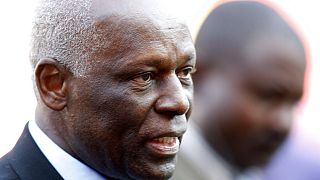
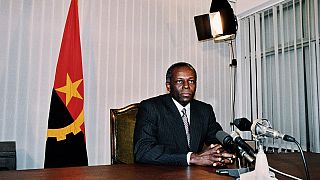
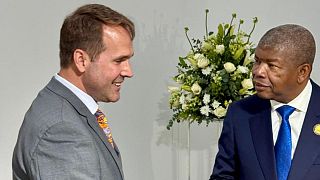
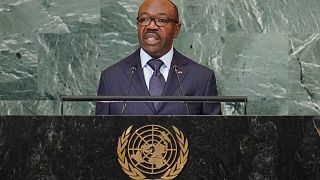
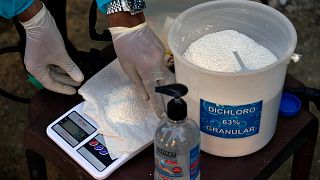


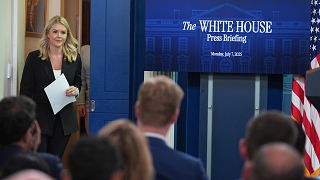
Go to video
Paraguayan town celebrates vibrant Kamba Ra'anga festival with masks, fire and tradition
11:16
Angola hosts U.S.-Africa summit amid calls to revive trade ties {Business Africa}
01:47
Chinese city of Xuchang is world's biggest producer of wigs
01:15
U.S. considers adding more African countries to travel ban
01:00
Renewed calls to end plastic pollution on World Environment Day
00:52
Bill Gates says most of his $200 billion fortune will go to Africa over next 20 years